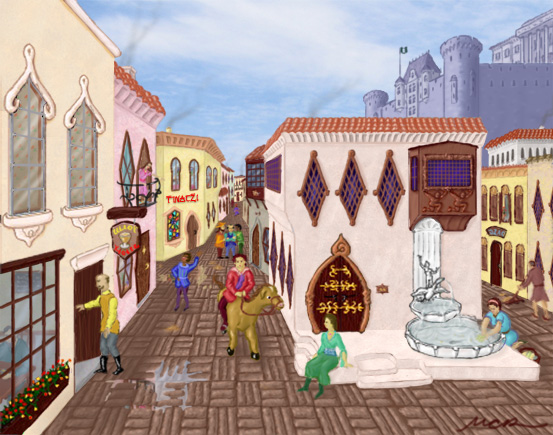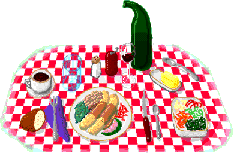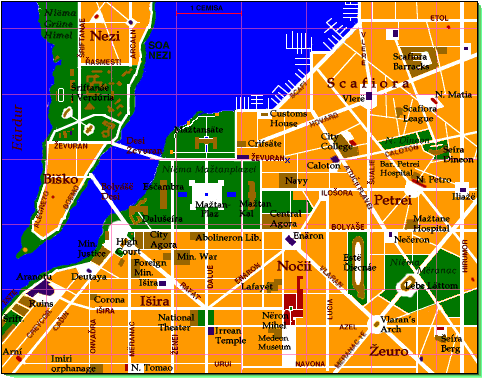|
| ||||||

Before you go, you may wish to acquire Verdurian clothing, or an approximation to it, so as not to stand out too much. The usual Western tourist outfit will be considered too revealing and low-class.
 The common coin of Verduria is the fale or large silver piece, a little more than 3 cm wide; the silver aržentul is a third the size (and value). There are also gold coins of the same size but twelve times the value: the large oř and the small ořula. In addition there is a small silver-tin coin, the emura, worth 1/4 aržentul; and a large tin coin, the stana, worth 1/6 emura.
The common coin of Verduria is the fale or large silver piece, a little more than 3 cm wide; the silver aržentul is a third the size (and value). There are also gold coins of the same size but twelve times the value: the large oř and the small ořula. In addition there is a small silver-tin coin, the emura, worth 1/4 aržentul; and a large tin coin, the stana, worth 1/6 emura.
By modern terrestrial standards Verduria is a high-price, low-wage economy. A skilled worker makes about two falî a day. The traveler, however, can count on spending several times this amount per day.
Almean kingdoms are usually very concerned to regulate the flow of money (at least, the flow outward), and most require that only their own coins be used, and that private or foreign gold be exchanged by licensed moneychangers (celkunomî) or banks (kunnáî), for a fee (5-20% depending on the locality; in Verduria city it is 12.5%, by law). Merchants have their own reasons for checking for the state's imprint on coins proffered: fear of forgery. However, Verdurian coins are widely accepted throughout the Plain.
A warning: Prices are simply displayed as numbers; there's no indication of the type of coin. It's generally falî, but for small purchases it may be in emurî or stanî. You're expected to know, and some merchants will not correct you if (say) you offer emurî for a debt in stanî, thus paying 6 times the price.
For more on coins and prices in the Plain, including the coinage of other states, see The Kingdom of Verduria.
For the necessities of daily life cash is the only legal tender. For large purchases (more than five ořulî) one can also pay with a zetdeče, a bank draft. It's a hassle both to get one and to redeem one— you will be treated with deference, but with the utmost of triple-checked punctiliousness.
In the cities this will mean a clean, private room with a bed, fireplace, goose-down pillows and comforters, a pail of hot water, and laundry service. At a roadside inn rooms may be shared, the mattresses are straw, and the pillow is a cloth sack stuffed with wool, old rags, or shells. And in small towns, or when the inn is full, there may be nothing much more than blankets spread on a pile of straw, or simply tossed on the floor near the fire.
Hospitality is an old Caďinorian virtue— Rhošriftul e aď kašul, as the proverb has it: "A stranger is a god in disguise"— and in the countryside it is often possible to get (somewhat primitive) lodging at a farmhouse merely by asking. It's customary to offer one fale in return. On the main routes, peasants are surlier; expect to ask at three or four houses before finding a room.
It's never wise to seek lodging late at night, not only because prices are likely to be higher, but because inns (and farmhouses) are not geared to high traffic, and fill up early.
 Your best bet for meals is also the inn. Food is likely to be good quality and fairly cheap— 1/2 to 1 falî for a large dinner (prando), 1 to 2 aržentulî for a light lunch or supper (elčena or zury). In the city, the prando is likely to be taken in the evening; in the country, at noontime.
Your best bet for meals is also the inn. Food is likely to be good quality and fairly cheap— 1/2 to 1 falî for a large dinner (prando), 1 to 2 aržentulî for a light lunch or supper (elčena or zury). In the city, the prando is likely to be taken in the evening; in the country, at noontime.
In the cities you can also find restaurants (lesteoi). These are establishments aimed at the well off; you can expect excellent food and service, at five to ten times the price of an inn. Eight falî for a steak dinner, and 3 for a bottle of the best Célenorian red, are not untypical prices.
For a light meal, try taverns (vifmitáî), coffeehouses (caunáî), or tea houses (čaináî). In Verduria city, these abound in the university quarter, the Biško. These are geared toward a lower class of clientele— students, artists, traders, sailors. The food will not be rich or varied, and the wine is watered, but it'll be abundant.
There's no Starbucks in Verduria, but it should be any day now.
Verduria itself is a port city, whose ships ply almost the entire southern hemisphere; you can find just about anything in its streets, especially the docks area (the Scafiora). The foundation of Verdurian cooking, however, is the zer or flatbread, spread with a savory sauce, and laid with vegetables, potatoes, cheese, and whatever meat is available— chicken, pork, beef, shellfish. Don't take one if it's made of betra. The zer may be rolled or flat, thick or thin, and crisp or soft. (Curiously, fish, abundant in this coastal town, are never served inside zerî.)
For a list of Verdurian foods, see the Thematic Dictionary.
You'd better be a drinker, not only because alcoholic beverages are often all that's available, but because they'll be a good deal safer than the local water. Verdurian wines aren't categorized into red/white/rosé like ours, but into five categories:
If you don't like any of that, ask for juice (suco) or milk (leme). If you've never drunk raw milk you may be rather surprised at the taste.
Foremost among the former is drama (ralinë). There are several kinds:
Eleďe church services are not very different from the Catholic mass (although they're in Verdurian, of course). More interesting for the visitor would be a visit to a temple— Caďinorian pagan, Irrean, or Endajué.
The pagans tend to put on the best show. A white bull is still sacrificed at the Investiture of Spring (Imameto demeče, 1 olašu). The first week of Cuéndimar is the Grand Festival honoring Enäron, filled with rites and playlets celebrating Caďinorian history. The Solemn March (Išet Cumproseo, 1st ceďnare in Želea), in origin a self-abasing plea to the gods to skip winter— it never works, but a good repentance may get you an Indian summer— is a spectacular sight, with its hordes of penitents chanting in the streets.

Sam nuržan er lavisian, řo e ceďue, runs the proverb: without food or dance it isn't a festival. Caďinorian holidays always include plenty of eating and drinking (in rural areas, at the expense of the local lord).
And dance is indeed ubiquitous in Verduria: as a popular diversion; as skilled performance; as a religious celebration. In the latter category the most developed are those of the Xurnese religion Endajué (which indeed takes dance as the central metaphor for the life of the cosmos). However, you might scan advertisements for the word cuzëece, which indicates that the dance is to be peformed in the ancient Cuzeian fashion— that is, in the nude.
There is much, much more: casinos; athletic competitions; dogfights; street performers (thankfully, not including mimes); lectures; eating out; walking. (The proseo or noontime promenade is an unshakeable Verdurian tradition.)
Look for specific events in the tutanél or newspaper. Verdurian newspapers are usually small eight-pagers, cheap and hastily printed, and without graphics. They run heavily to announcements, anecdotes, society gossip, government news, and news from abroad, plus some opinion pieces and poetry.
There are maps of Verduria-city (also Žésifo and Avéla) available; check any bookseller. The best maps are those intended for pilgrims, since they give street names and indicate the location of inns.
In smaller towns (to say nothing of the lower-class parts of Verduria, which maps tend to skimp on, when they don't just draw the legend on top of them) it's easy to get disoriented: the streets are a warren, and aren't always named. If you get lost, offer a child a few coins to lead you back to your inn or to a local landmark, such as the main temple.
A farmer going back to his land will often be willing to carry a passenger in his wagon. This is a cheap way to travel, and may even be free if you do some work for the farmer. On the other hand a farm somewhere in the Verdurian countryside two days' ride from anywhere is not, generally speaking, a happening scene.
You may save in the long run by buying your own horse (and of course it's the only way to get anywhere off the beaten trail). You can get a decent one for 60 falî, or a donkey for half that; and unless you abuse the poor thing terribly you can sell it once you're at your destination. But expect to pay a few ořulî to outfit the horse, and 1 aržentul a day to feed and stable it.
Magicians (alcedlomî) offer supernatural means of travel through the air; but magicians are a surly lot who don't consider themselves to be in the travel business. Expect long negotiations and bring gifts— food, fine wine, alchemical equipment, obscure books and scrolls.
The best defense is a little street smarts:
(Should you go armed? Only if you can handle a sword— it doesn't impress anyone merely hanging at your side. They don't call guns equalizers for nothing; it takes a good deal of training to be able to defend yourself with a sword.)
The purpose of the cilî is not law enforcement or detective work, as in terrestrial countries, but keeping the peace. The questions on a cilu's mind are
In brief, it's not considered the state's job to pursue criminals— or even to punish them, in the case of fraud, hooliganism, or petty theft. If you were an ordinary Verdurian citizen, you would have a network of friends and family to do that for you. The Verdurian serious crime rate is actually fairly low, for this reason. If a Verdurian girl is attacked, her brothers, cousins, father and uncles will be out for revenge, and not a very pretty one.
Your problem, as a traveler, is that you've left your network at home. You are not without recourse, however. If you have money left, you can buy vengeance, in the form of a mercenary, soldier, barbarian, or cilu with nothing else to do. (A fair price for such services is 1 fale a day; but retain half till vengeance is accomplished.) Ask the innkeeper for help finding such men.
If you're broke, you may still be able to interest one of these in your case by promising part of the booty to be recovered. Otherwise your best bet is one of the monastic military orders, such as the Clek Enäronei (Fist of Enäron) or the all-female Knights of Dévora.
If the crime happened in your inn, your innkeeper is required to keep and feed you for a week (longer, if you're wounded), at his expense. This law of course encourages innkeepers to keep their premises safe, and it works— you don't have to worry about being robbed or worse in your bed.
If you're wounded or sick, what you want is a lekaro, a physician. If what you need is surgery, expect rough but effective treatment, with alcohol or hallucinogens as anaesthetic. If you have something else, expect painful, expensive, and ineffectual treatment. Just wait out the illness, if you can— your chances are better. See a zeřašom (herbalist) for pain relief and some chance of a working folk remedy. If you get worse, try to get home, or at least find a good undertaker, rather than put yourself under the care of a lekaro.
If an iliu offers to treat you, however, accept without hesitation.
Follow the street-smart rules above, with one addition: Act like a lady. In a class-conscious society like Verduria's, well-off women will generally be treated with deference.
By American standards, Verdurians are conventional but quite open about sex. There is no feeling that language must be moderated in front of— or in the mouths of— women, for instance.
It's best to be cautious about dress; again, the reason is related more to class than to sex. The lower and upper classes can be quite casual about nudity, but the middle class is not. If you dress revealingly, you'll be taken— and treated— as lower class.
Lesbians have an easier time of it; in fact, if you go for femmes, Verduria may seem a paradise. Verdurian culture does not condemn lesbian affairs; indeed, they're considered normal in girlhood (and even salutary, since they're seen as diverting attention from boys). Middle and upper class girls attend (segregated) schools, where they form attachments that often last for life.
But note that most of these girls get married, anyway. These affairs, though very important to the women of course, are simply ignored as unimportant by their husbands.
If you want a more separatist atmosphere, you want to hang with the ponî (butches), who are, like gays, marginalized. Pona hangouts are more scattered, though again the Biško is a good place to start; try the čaináî. In Žésifo try the game courts at the Imperial Gardens; in Avéla look for certain clothing stores— the ones that serve caua.

If you're on Soa Nezi (its name is actually Arin, but everyone calls it just The Island), the towers of the University are generally visible; and in the northern part of the island, the battlements of Arcaln loom to the north.
Much of Verduria is laid out in a grid pattern; these are new areas of the city, laid out during the Eleďe dynasty. The older areas of the city are in the north and on Soa Nezi. The enormous Niëma Mažtanlagane (City Plaza Park) indeed occupies the site of ancient Arénica; the wizard Utu cleared it out to create parkland around his palace (now the Mažtansäte). The Scafiora and Petrei areas date to the Dark Years and its streets show the characteristic medieval formlessness.
The many wide boulevards connecting the city's monuments (such as prosiî Rafát, Enäron, Vlaran, and Mëranac 1e) are the work of the vainglorious Mëranac 1e of the Abolinerons (note that many of the focal points are Caďinorian pagan temples). The boulevards also make it easy to navigate the city; the general rule is to find the nearest big street and look for the landmark at one end or the other.
Addresses are written 'backwards', from the general to the particular. A full address in Verduria-city would look like this:
Verdúria-mažtana
Išira
37, Prosia Fleot
Prusi Frédrotei [Fred's Bar]
Frédrot Sevney
For a smaller town, the neighborhood is not given:
Pelym, Verdúria-fetöra
8, Prosia Ružkunnaomië
Šualnáe Imloëca Uem [Hertz Rent-a-Horse]
Villages and rural areas do not have addresses per se. Mail can be sent care of the local lord or alďoro (village head). Visitors should arrange for someone to meet them at the nearest village, or ask at a temple or church, or the alďoro's house, for someone to show the way.
|
| ||||||